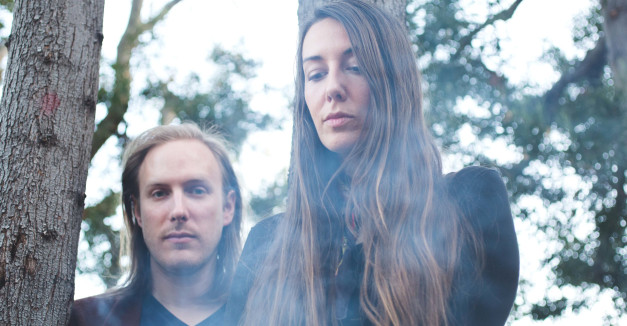Brooklyn-based blues rock duo She Keeps Bees had always been a model DIY outfit: self-taught musicians who produced and engineered their own records. Their 2011 LP Dig On, for instance, was recorded in the Catskill Mountains in a hand-built log cabin.
From the beginning, they made things work on their own. The duo (and couple), singer/guitarist Jessica Larrabee and drummer Andy LaPlant, met while Larrabee was working in a bar across the street from LaPlant’s Brooklyn apartment. Larrabee, who was writing and performing as a solo act at the time, suggested that he join her. LaPlant learned the basics on a pieced-together kit, and soon the two were honing their smoldering, stripped-down sound.
The duo plays Duffy’s Tavern on Sunday with Oquoa and Shilpa Ray and her Happy Hookers. RSVP here.
Yet, for Eight Houses, their forthcoming studio album (which premiered this week on AV Club), Larrabee and LaPlant shed their comfort zone and stepped into a someone else’s studio.
Enlisting producer Nicholas Vernhas, who had worked with bands known for their soundscapes such as The War On Drugs, Deerhunter, and Dirty Projectors, allowed them to zone in on creation rather than production.
“It was scary, you know, because we weren’t used to working on a scheduled time,” Larrabee says. “We had been doing our thing ourselves for so long, and [we were] nervous about reaching out like that.”
The yield is a texturally rich, yet very deliberately subtle and spacious record. Larrabee’s thick guitar riffs plow forth, backed by LaPlant’s minimalist drumming, all simplified to showcase Larrabee’s vocals, which range in intensity from dripping honey at their softest to Grace Slick-esque at their most powerful. Accents are strategically place throughout, like the swinging bar piano on the opening track “Feather Lighter” and the fuzzy horn ensemble on the dynamic “Owl,” on which Sharon van Etten and multi-instrumentalist Adam Schatz (Landlady, Man Man) make guest appearances.
“We just kind of added slowly, and if it didn’t feel like it needed [additions], it was just left open,” Larabee says. “I think people can get bogged down with too much opportunity.”
Frilly window dressings have never been She Keeps Bees preference, but the band embarked on their studio session with an open mindset that allowed Vernhas to layer without forsaking their “if it feels right” songwriting attitude.
At no point is that more apparent than midway through the album in the near-stillness of “Burning Bowl.” Originally written for guitar, Larrabee recast the song for piano one late night in the studio to give it a haunting quality.
“Nicholas actually went in and did a lot of … this eerie electronic stuff kind of folded into it,” she explains. It’s as if the listener were sitting in a hollow, drafty old house, air swirling about gently.
One might also look to “Burning Bowl” for the central thematic elements of Eight Houses, which in many ways echoes the band’s musical philosophy. In the song, Larrabee recounts her spiritual healing ritual of “writing things out of your life.”
She sings: “If it’s all the same/I’d rather forget/burn it in a tin can/let the flame take each page/ashes in the waves disintegrate/transform this pain.”
It’s about not letting oneself be torn down, to take control of one’s influences and surroundings, one’s identity.
“The authority that you have in your life can be taken and you dont even know it. That idea of authorship, being able to write things back into your life, or write them out,” Larrabee says.
Eight Houses explores many facets of identity, and at its darkest, examines the pain of Native American oppression. Informed by their first tour across the United States, Larrabee researched early American history and began to realize the horror of the culture of assimilation. On the sorrowful “Wasichu,” she illustrated the internal schism brought on at Native American boarding schools, singing, “… made you cut your hair/cover your body/sit like a dog … they starve your children/work with dead land/stop speaking your language.”
The goal, she explains, is to attempt to understand these oft-forgotten scars and to heal by confronting them.
Among the stories of suffering, Larrabee did find some tales of redemption. The band follows on a much more triumphant note, chronicling the Battle of Little Bighorn on the pounding “Greasy Grass.”
“I felt like that was a story [on] the other side of that, the red road. Not only [being] physically on it, but taking it back, being able to reclaim it,” she says.
Larrabee has always taken pride in the healing aspect of their music, balancing the negative with the positive. While trying to do so for others, she explained that the recent passing of her father has caused her to think differently of one song on the album in particular.
“I wrote … “Radiance” for two friends who had lost loved ones, and I was really trying to dig in deep about the metaphysical world and [how] a love so strong can never be broken and now I’m singing it and it’s like, I have to sort of understand it myself.”
Larrabee is hesitant to call it “self-help.” There is no defined program, no number of steps to be taken. Self-discovery might be a better way to describe it. How does one react when faced with a toxic situation or an internal struggle?
“Sometimes I feel like you can be in a rut of a routine and not even realize the energy that you’ve been spending isn’t nourishing you the way that you need it to,” she explains. “It starts to seep into every decision.”
When that happens, look back to what Larrabee also says about the band’s writing: like songs, identity can be broken down and built back up again.




